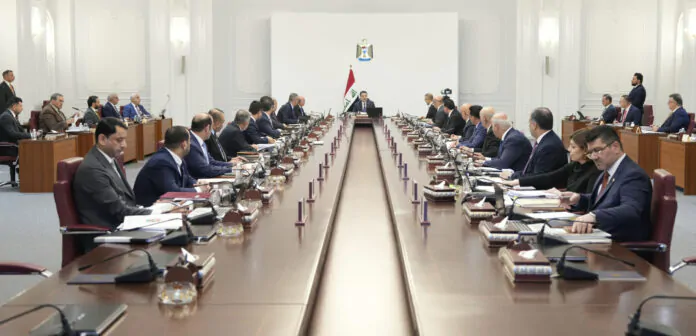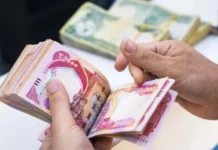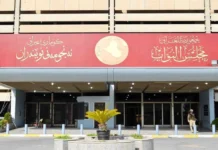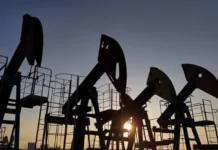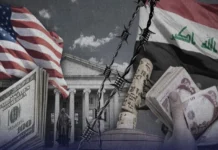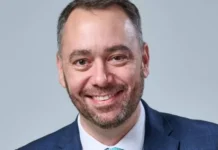Prime Minister Mohammed Shia Al-Sudani confirmed on Tuesday that his government has reduced poverty rates by 17.6%, increased non-oil revenues by 6%, and fulfilled 62% of its project targets in various sectors over the past two years.
Al-Sudani stated at a cabinet meeting commemorating the government’s second anniversary, “the overall achievement rate of government targets across various fields has reached 62%.” We were successful in a number of important areas, but we had difficulties in others, and there were delays with some details and files.
Al-Sudani noted that the Iraqi government released three reports outlining the program’s implementation and multiple assessments of progress over the past two years. The accomplishments encompassed numerous districts and urban centers and extended beyond a single sector, city, or province.
“a dedicated service and engineering team focused on delivering rapid services and addressed stalled projects, some dating back to 2005, through cabinet decisions,” the PM was quoted as saying by Al-Sudani’s media office.
According to Al-Sudani, there were 1,471 projects that were delayed. However, work on 555 ministries’ projects has resumed, bringing the total number of stalled projects down to 916. In addition, work on 442 provincial contracts and projects was resumed, with 8,934 ongoing projects.
“Providing drinking water, wastewater treatment plants, networks, and infrastructure projects were our primary focuses. Due to population growth, we have added new projects as of yesterday, he explained.
He stated, “The traffic congestion relief project was one of the most significant initiatives in Baghdad, which had not seen a bridge since 1996, despite the expansion,” with regard to road and bridge projects. We started mass-visitation-related road and bridge projects last year, which helped millions of visitors and reduced traffic accidents.
However, he acknowledged that some services, such as the water desalination project in Basra and the necessary services at Iraqi airports, were not provided in a timely manner, and he added, “We were delayed in preparing residential land allocations; We made a promise to begin distributing 500,000 residential plots because complicated land issues impede housing projects.
“We opened new hospitals, specialized centers, and health clinics, and rehabilitated a significant number of hospitals and health centers,” he stated regarding the healthcare sector.
In the electricity sector, he disclosed achieving the highest power production, 27,000 megawatts, and launching new projects to alleviate network congestion, including those involving new feeders and combined cycle. With 15 projects underway, totaling 5,720 megawatts, we have made significant progress in solar energy,” he continued.
Al-Sudani made important residential cities about housing that will provide housing units with all of the services they need. He also talked about progress in school building projects, including some that have stalled. He also said that the Iraqi-Chinese agreement projects will end this year and that schools in all provinces have been fixed up and restored.
He said that a project for the “Iraq Development Fund” aims to find a new way to buy services to meet the need for schools. The “Study in Iraq” project, the national education strategy for 2022–2031, and a scholarship program for prestigious university studies were also launched.
In the fight against poverty, 962,000 families were added to social security programs, an increase of 85%. This means that 7.6 million people are now covered.
The Prime Minister of Iraq stated, “We distributed 130 million monthly food baskets since the formation of the government over two years” and activated student grants, school nutrition, and tuition fees for beneficiaries, individuals with disabilities, and children with diabetes. Additionally, the PM stated that government measures contributed to the reduction of Iraq’s poverty rate from 23% to 17.6%.
He mentioned the government’s “Riyada” employment initiative and the hiring of hundreds of thousands of graduates with higher degrees as ways to address unemployment. The unemployment rate decreased from 16.5% to 14.4% as a result of these measures.
Al-Sudani stated that the government has achieved significant results in the fight against corruption by implementing multiple levels of institutional reform and adopting a new approach to recovering funds and apprehending wanted individuals.
He stated that “the government has developed structural reforms steps to that all state institutions have contributed” regarding financial and economic reform, indicating that “total inflation has been reduced from 4.9% in 2022 to 3% in 2024.”
“The amounts collected from electronic payment reached 7.6 trillion dinars (approximately $5.8 million) after it was in January 2023 not exceeding 2.4 trillion dinars (approximately $1.8 million),” he continued, “we achieved an increase in non-oil revenues by 6%, and raised tax revenues for 2024 by an increase of 23%.”
He said that one of the most important changes in the budget law was the creation of the “Iraq Development Fund,” which was a new plan to help the private sector.
He made the following announcement: “We initiated efforts to localize the pharmaceutical industry, opening several projects, and increasing local coverage of medicine needs to 35%, up from 10%, with plans to reach 85% within three years.”
Al-Sudani acknowledged the difficulties encountered at border crossings despite network integration and reforms, noting that revenues have not yet reached the desired level, particularly in Iraq’s Kurdistan Region.
He acknowledged, “Despite their importance to supporting the national economy, we have fallen behind in advancing the tourism sector, failing to invest in our religious, historical, archaeological, and natural sites.”
He mentioned achieving self-sufficiency in strategic crops and emphasized the need for additional efforts to implement an agricultural vision based on the resources available in water.
“Decisions have been made to establish a national mobile phone company, with international partnerships underway to bring added revenue for the state,” Al-Sudani announced.
He added, “We announced the Development Road Project and signed a four-party memorandum of understanding with Qatar, UAE, and Türkiye, with ongoing work toward completion,” noting that in the sports industry, athletes require a significant portion of completed stadiums.
He stated that they are concurrently collaborating with specialized firms on the design for the rehabilitation of existing railroads, which will be a secondary project until the development road project is constructed.
He announced the “Baghdad Metro Project” and the “Karbala–Najaf Railway Project,” stating that negotiations are ongoing with relevant authorities and consulting firms.
The Iraqi MP emphasized that the water management project with Turkey is one of the most important strategic initiatives that will guarantee agricultural sector sustainability.
Al-Sudani reported that the berths, immersed tunnel, navigation channel, container yard, and connecting road at the Al-Faw Grand Port had made significant progress.
“We reached an agreement with international coalition countries to conclude their mission within a declared timeframe,” he declared.
He stated that they were successful in passing a UN Security Council resolution regarding the UN mission in Iraq.
“We continue to face financial challenges while ensuring liquidity and prioritizing spending as we shift to a program-based budget aligned with the ministerial agenda,” the PM stated, according to the media office. “We aim to increase revenue, rationalize spending, and digitize financial and customs transactions.” Compliance and governance standards are being applied to all financial transactions.
“Regional conflicts have direct impacts on Iraq’s security and economy,” the statement continued, “Outdated legislation no longer aligns with current needs, hindering progress in construction, investment, and services.”
“We are preparing for a government reshuffle based on performance metrics, not as a political stance against any bloc or party,” Al-Sudani stated, “but to enhance effectiveness to meet the needs of the stage and the citizens’ expectations.”
“We have completed the long-awaited provincial council elections,” the Iraqi PM said in his conclusion, citing the population count as one of the significant responsibilities that lie ahead of the government.
